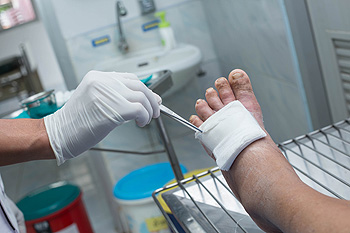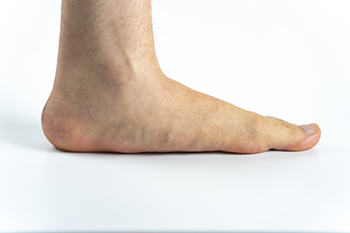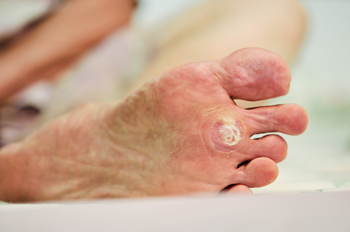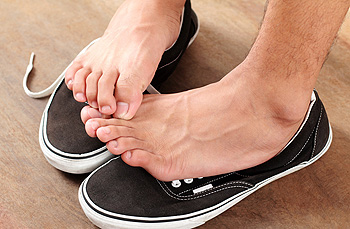Connect With Us
Blog
Items filtered by date: November 2023
Problematic Diabetic Foot Symptoms

For those individuals with diabetes, about half experience nerve damage, often affecting the feet and legs. Numbness, tingling, or no symptoms at all may arise, depriving diabetic patients of pain perception. While the idea of pain-free living seems attractive, it heightens the risk of overlooking minor foot problems, such as cuts or sores, which can escalate and pose serious problems. The absence of pain sensation can lead to severe complications, potentially resulting in limb loss if wounds or ulcers on the foot do not heal. Factors increasing the likelihood of nerve damage include poorly managed blood sugar, prolonged diabetes duration, age over 40, excess weight, high blood pressure, and elevated cholesterol. Nerve damage, coupled with poor blood flow, significantly elevates the risk of foot ulcers that resist healing and may become infected. Daily foot checks are pivotal. Vigilantly examining your feet allows for early issue identification and timely treatment, crucial in reducing serious complications. A podiatrist is medically trained to manage foot problems associated with diabetes, including wound care for ulcers and infections. If you have diabetes, it is suggested that you schedule regular visits with a podiatrist to monitor the health of your feet.
Diabetic foot care is important in preventing foot ailments such as ulcers. If you are suffering from diabetes or have any other concerns about your feet, contact one of our podiatrists from Crosstown Podiatry. Our doctors can provide the care you need to keep you pain-free and on your feet.
Diabetic Foot Care
Diabetes affects millions of people every year. The condition can damage blood vessels in many parts of the body, especially the feet. Because of this, taking care of your feet is essential if you have diabetes, and having a podiatrist help monitor your foot health is highly recommended.
The Importance of Caring for Your Feet
- Routinely inspect your feet for bruises or sores.
- Wear socks that fit your feet comfortably.
- Wear comfortable shoes that provide adequate support.
Patients with diabetes should have their doctor monitor their blood levels, as blood sugar levels play such a huge role in diabetic care. Monitoring these levels on a regular basis is highly advised.
It is always best to inform your healthcare professional of any concerns you may have regarding your feet, especially for diabetic patients. Early treatment and routine foot examinations are keys to maintaining proper health, especially because severe complications can arise if proper treatment is not applied.
If you have any questions please feel free to contact our offices located in Wayne, Montclair, and Randolph, NJ . We offer the newest diagnostic and treatment technologies for all your foot and ankle needs.
What Are the Causes and Symptoms of Flat Feet?

Flat feet, also known as fallen arches or pes planus, is a common condition where the arches of the feet are significantly reduced or nonexistent. This can be caused by various factors and is often associated with a range of symptoms. The most common cause of flat feet is genetics, where an individual inherits the condition from their family. In some cases, arches may not fully develop during childhood, leading to flat feet. Other causes can include injuries, muscle or tendon imbalances, and conditions such as arthritis, which can weaken the arch-supporting structures. Symptoms of flat feet can vary, with some people experiencing pain and discomfort, particularly in the arch area or heels. Others may not have any noticeable symptoms at all. The condition can lead to overpronation, causing the feet to roll inward when walking, which may result in problems like shin splints or knee pain. If you have flat feet, it is strongly suggested that you are under the care of a podiatrist who can offer you relief and treatment options.
Flatfoot is a condition many people suffer from. If you have flat feet, contact one of our podiatrists from Crosstown Podiatry. Our doctors will treat your foot and ankle needs.
What Are Flat Feet?
Flatfoot is a condition in which the arch of the foot is depressed and the sole of the foot is almost completely in contact with the ground. About 20-30% of the population generally has flat feet because their arches never formed during growth.
Conditions & Problems:
Having flat feet makes it difficult to run or walk because of the stress placed on the ankles.
Alignment – The general alignment of your legs can be disrupted, because the ankles move inward which can cause major discomfort.
Knees – If you have complications with your knees, flat feet can be a contributor to arthritis in that area.
Symptoms
- Pain around the heel or arch area
- Trouble standing on the tip toe
- Swelling around the inside of the ankle
- Flat look to one or both feet
- Having your shoes feel uneven when worn
Treatment
If you are experiencing pain and stress on the foot you may weaken the posterior tibial tendon, which runs around the inside of the ankle.
If you have any questions please feel free to contact our offices located in Wayne, Montclair, and Randolph, NJ . We offer the newest diagnostic and treatment technologies for all your foot and ankle needs.
HPV Strains and Plantar Warts

Human Papilloma Virus, or HPV, is a large family of viruses, with over 150 types, and it is common for individuals to contract at least one type during their lifetime. Symptoms vary depending on the HPV strain, and while approximately 75 percent of HPV types cause common warts, others lead to more serious conditions. Often, HPV shows no symptoms, making some of its effects silent. For instance, plantar warts are a lesser known manifestation of HPV. They develop under the pressure points of the feet, such as the heels or the balls of the feet, and can be identified by their hard, grainy texture. Although they can be painful due to their location, some individuals may not notice them if they are not causing discomfort. It is advisable to examine your feet regularly, checking for any new growths or changes, including warts, as they could indicate an HPV infection. If you find you have a wart on your foot, it is suggested that you make an appointment with a podiatrist to have it examined and treated as necessary.
Plantar warts can be very uncomfortable. If you need your feet checked, contact one of our podiatrists from Crosstown Podiatry. Our doctors will assist you with all of your foot and ankle needs.
About Plantar Warts
Plantar warts are the result of HPV, or human papillomavirus, getting into open wounds on the feet. They are mostly found on the heels or balls of the feet.
While plantar warts are generally harmless, those experiencing excessive pain or those suffering from diabetes or a compromised immune system require immediate medical care. Plantar warts are easily diagnosed, usually through scraping off a bit of rough skin or by getting a biopsy.
Symptoms
- Lesions on the bottom of your feet, usually rough and grainy
- Hard or thick callused spots
- Wart seeds, which are small clotted blood vessels that look like little black spots
- Pain, discomfort, or tenderness of your feet when walking or standing
Treatment
- Freezing
- Electric tool removal
- Laser Treatment
- Topical Creams (prescription only)
- Over-the-counter medications
To help prevent developing plantar warts, avoid walking barefoot over abrasive surfaces that can cause cuts or wounds for HPV to get into. Avoiding direct contact with other warts, as well as not picking or rubbing existing warts, can help prevent the further spread of plantar warts. However, if you think you have developed plantar warts, speak to your podiatrist. He or she can diagnose the warts on your feet and recommend the appropriate treatment options.
If you have any questions please feel free to contact our offices located in Wayne, Montclair, and Randolph, NJ . We offer the newest diagnostic and treatment technologies for all your foot and ankle needs.
When to See a Podiatrist About Itchy Feet

Itchy feet can be a bothersome issue, but they are often mild and temporary. Common symptoms associated with itchy feet include the formation of crust as a wound heals, and flaky or peeling skin due to extreme dryness, rashes, redness, warmth, and swelling. Sometimes, itchy feet can lead to pus-filled blisters or general tenderness and discomfort. In certain circumstances having itchy feet may necessitate a visit to a podiatrist, such as if you develop oozing blisters or feel a worm-like tingling sensation in your feet. Persistent itching that lasts for more than two weeks or recurrent flare-ups may signal a more serious issue. If the itching spreads to other areas of your body, it's probably a good idea to consult a podiatrist. In some cases, itchy feet can be a sign of underlying health problems. For instance, swelling in the legs, arms, and stomach, yellowish skin or eyes, or reduced urinary output could indicate kidney or liver issues. When these symptoms are present alongside itchy feet, it may be an indicator of potential systemic concerns. If you experience persistent or recurring foot itching, especially if it spreads to other areas of your body and occurs during pregnancy or menopause, it is suggested that you make an appointment with a podiatrist for a complete examination and suggestions for treatment.
Everyday foot care is very important to prevent infection and other foot ailments. If you need your feet checked, contact one of our podiatrists from Crosstown Podiatry. Our doctors can provide the care you need to keep you pain-free and on your feet.
Everyday Foot Care
Often, people take care of their bodies, face and hair more so than they do for their feet. But the feet are a very important aspect of our bodies, and one that we should pay more attention to. Without our feet, we would not be able to perform most daily tasks.
It is best to check your feet regularly to make sure there are no new bruises or cuts that you may not have noticed before. For dry feet, moisturizer can easily be a remedy and can be applied as often as necessary to the affected areas. Wearing shoes that fit well can also help you maintain good foot health, as well as making it easier to walk and do daily activities without the stress or pain of ill-fitting shoes, high heels, or even flip flops. Wearing clean socks with closed shoes is important to ensure that sweat and bacteria do not accumulate within the shoe. Clean socks help to prevent Athlete’s foot, fungi problems, bad odors, and can absorb sweat.
If you have any questions please feel free to contact our offices located in Wayne, Montclair, and Randolph, NJ . We offer the newest diagnostic and treatment technologies for all your foot and ankle needs.

